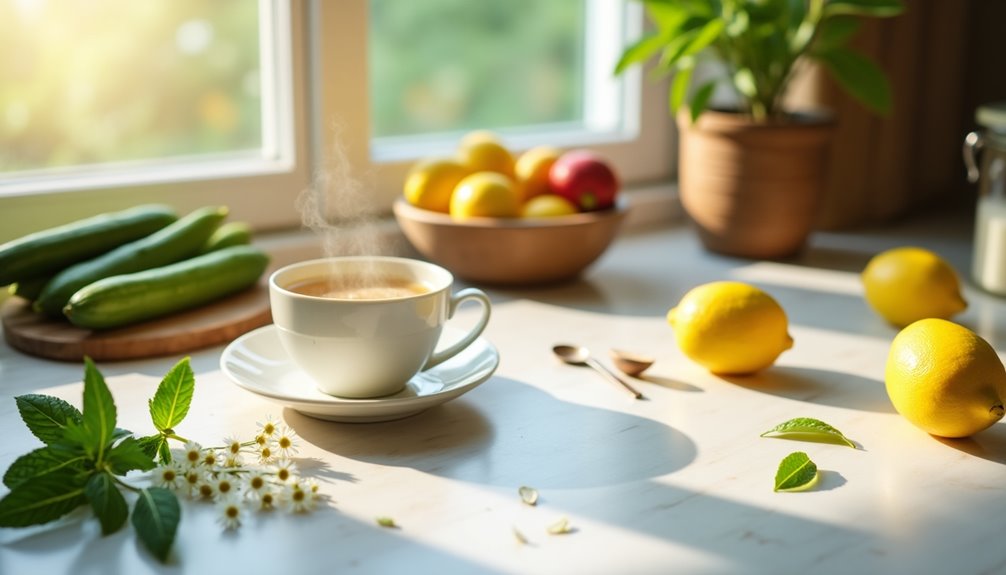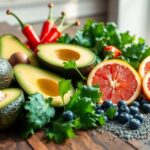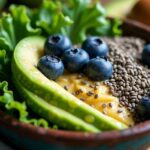To prevent bloating after meals naturally, focus on your gut health and adopt mindful eating habits. Chew your food thoroughly and savor each bite in a peaceful setting. Incorporate fiber-rich foods and digestive aids like pineapple and kiwi into your diet. Staying hydrated is essential, so drink plenty of water and choose herbal teas over carbonated beverages. Don't overlook the importance of probiotics; include yogurt or fermented foods in your meals. Finally, manage stress through deep breathing and light activities, as they improve digestion. If you want to explore more tips, there's plenty more to uncover.
Key Takeaways
- Incorporate probiotic-rich foods like yogurt and kimchi to balance gut microbiome and enhance digestion.
- Practice mindful eating by chewing slowly and savoring flavors to improve digestion and reduce bloating.
- Choose fiber-rich foods and stay hydrated to promote healthy digestion and nutrient absorption.
- Manage stress through meditation and light activity to support digestive health and prevent bloating.
- Opt for non-carbonated drinks like herbal teas or infused water instead of soda to avoid gas and bloating.
Understand the Causes
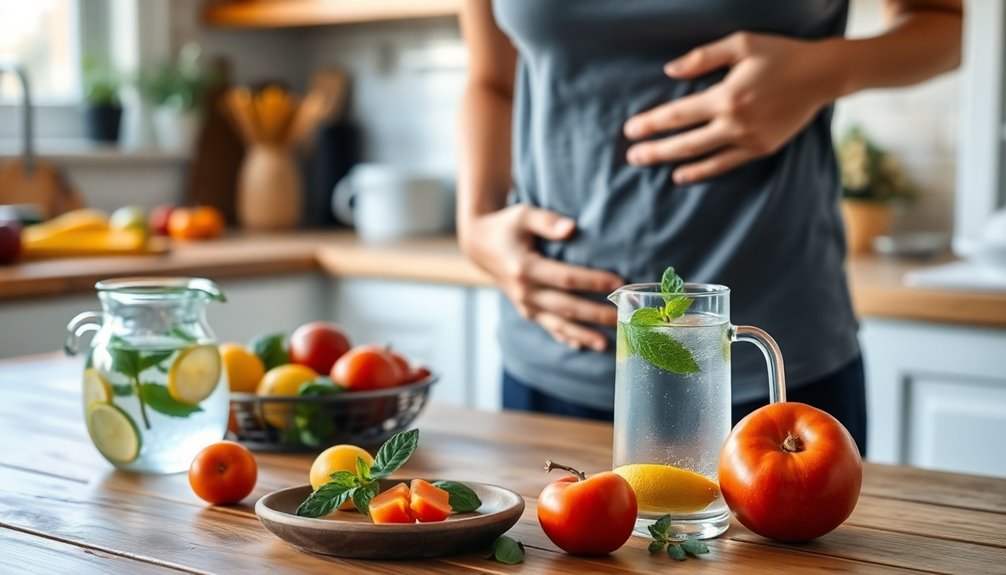
When you sit down to eat, understanding what could cause bloating afterward is pivotal. Bloating can stem from various factors, often linked to your gut health and the way your body processes food. One common reason is the lack of adequate digestive enzymes. These enzymes play a crucial role in breaking down the food you consume, enabling your body to absorb nutrients effectively. If your body isn't producing enough of these enzymes, the undigested food can ferment in your gut, leading to uncomfortable gas and bloating.
Another factor to keep in mind is the quality of your gut health. A balanced gut microbiome supports digestion and helps to prevent bloating. If your gut is imbalanced, perhaps due to diet or stress, it may struggle to process food properly. This imbalance can lead to an overgrowth of bacteria that produce gas when digesting certain foods, contributing to that bloated feeling you want to avoid.
You can support your digestive enzymes and enhance gut health by incorporating probiotic-rich foods like yogurt and fermented vegetables into your meals. Staying hydrated is also essential, as water aids in digestion and helps maintain the balance of gut bacteria. By understanding these factors, you empower yourself to make choices that foster a healthier digestive system, ultimately minimizing the chances of bloating after meals. Additionally, addressing underlying health conditions can further improve your gut health and reduce bloating. The more you know, the better you can set yourself up for comfort and satisfaction at the dining table.
Mindful Eating Practices
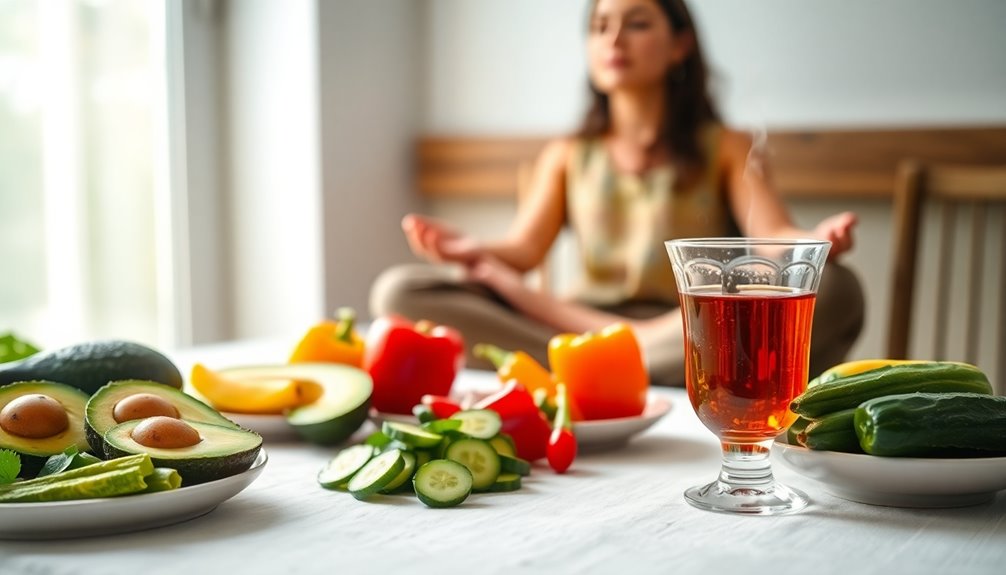
Practicing mindful eating can greatly reduce bloating after meals. By focusing on your eating experience, you can enhance digestion and enjoy your food more fully. Start by setting the stage: find a quiet space, free from distractions, where you can truly connect with your meal.
Begin with mindful breathing. Take a few deep breaths before you start eating. This simple practice calms your nervous system and prepares your body for digestion. As you inhale and exhale, allow yourself to become aware of your hunger signals and how your body feels.
Next, as you take your first bite, visualize your food. Notice its colors, textures, and aromas. This not only enhances your appreciation but also slows down your eating pace, making it easier for your body to signal when it's full. Chew each bite thoroughly, savoring the flavors, and pay attention to the sensations in your mouth. This process helps you tune into your body's hunger and fullness cues, reducing the likelihood of overeating.
Throughout your meal, stay present. If your mind wanders to distractions or worries, gently bring your focus back to your plate. You'll find that being fully engaged in the act of eating allows you to enjoy your meal more, while also minimizing the risk of bloating afterward. By adopting these mindful eating practices, you're not just nourishing your body; you're also fostering a deeper connection with your food and your well-being. Additionally, incorporating deep breathing exercises can further enhance your relaxation and digestion during meals.
Choose the Right Foods
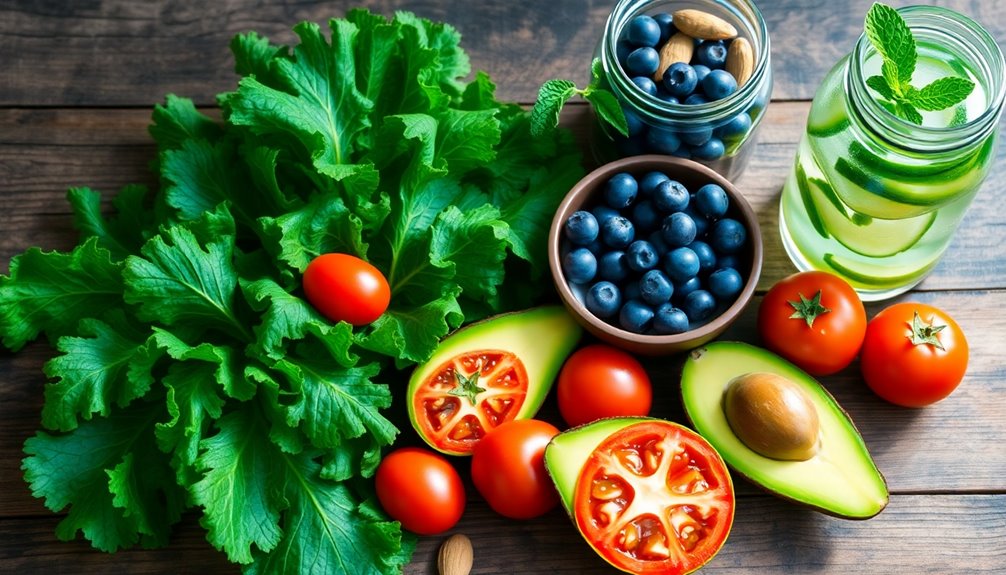
After cultivating a mindful eating practice, the next step in preventing bloating is to choose the right foods. Selecting foods that promote digestion can make a significant difference in how you feel after meals. Focus on incorporating fiber-rich choices and foods that contain digestive enzymes. These elements can help your digestive system break down food more efficiently and reduce the chances of bloating.
A plant-based diet, rich in antioxidants and fiber, can further enhance your digestion and overall health.
Here's a handy table to guide you in selecting the right foods:
| Fiber-Rich Choices | Foods with Digestive Enzymes |
|---|---|
| Whole grains (quinoa, brown rice) | Pineapple (bromelain) |
| Legumes (lentils, chickpeas) | Papaya (papain) |
| Vegetables (broccoli, spinach) | Mango |
| Fruits (apples, berries) | Kiwi |
| Nuts and seeds (chia, flaxseeds) | Fermented foods (kimchi, yogurt) |
When you fill your plate with these options, you not only nourish your body but also create an environment that encourages smooth digestion. Fiber-rich choices help regulate bowel movements and promote a healthy gut, while foods rich in digestive enzymes can assist in breaking down proteins and sugars, further reducing discomfort.
Stay Hydrated
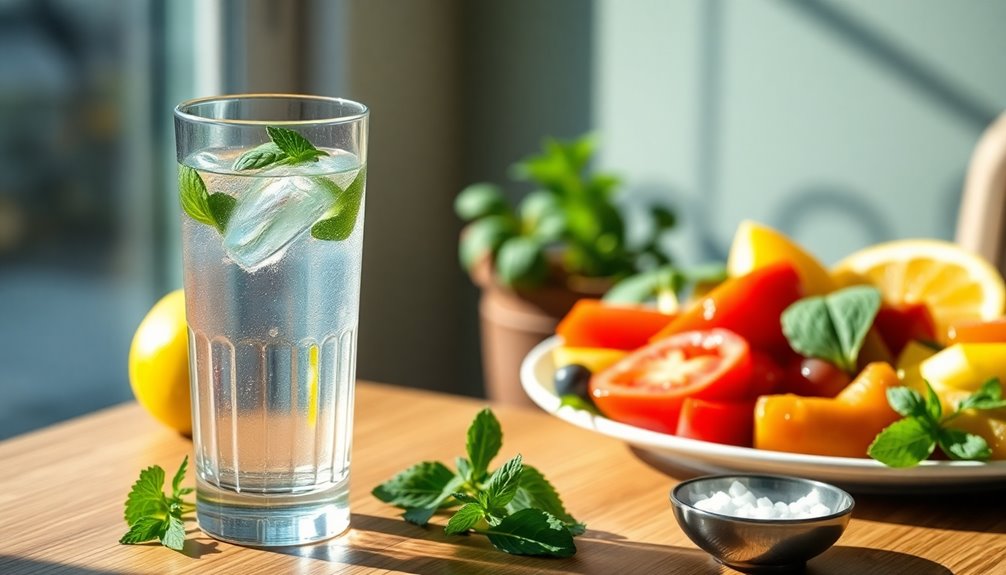
Staying well-hydrated is crucial for maintaining peak digestion and preventing bloating after meals. When your body's adequately hydrated, it can efficiently break down food and absorb nutrients, reducing the chances of discomfort. Hydration benefits your digestive system by aiding the movement of food through your intestines and preventing constipation, which can contribute to that bloated feeling. Additionally, maintaining proper hydration can help mitigate the effects of high blood pressure, as dehydration can sometimes lead to increased stress and strain on the body.
To ensure you're receiving enough water intake, consider these practical tips:
- Drink Water Before Meals: Having a glass of water about 30 minutes before you eat can aid digestion and help you feel satisfied, potentially preventing overeating.
- Keep Water Handy: Carry a reusable water bottle with you throughout the day. It's a simple reminder to sip regularly, making hydration a routine rather than a task.
- Monitor Your Intake: Aim for at least 8-10 cups of water daily. Adjust based on your activity level, climate, and individual needs. If you're active or live in a hot area, you may need more.
- Infuse Your Water: If plain water's not your preference, try adding slices of fruits, herbs, or vegetables for a revitalizing twist that'll encourage hydration without added sugars.
Incorporate Probiotics
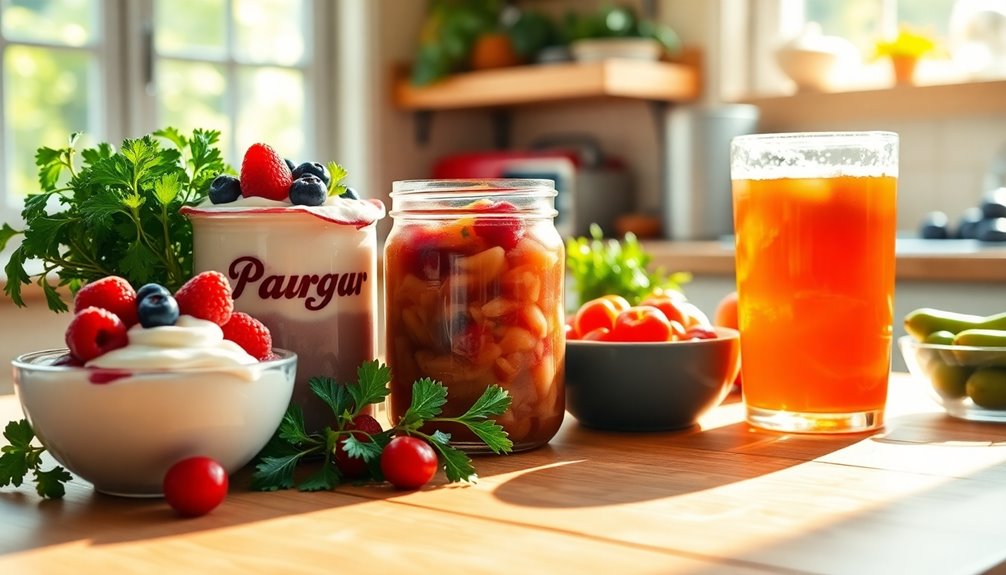
Probiotics can play a significant role in enhancing your digestive health and preventing bloating after meals. These beneficial bacteria contribute to a balanced gut microbiome, which is essential for peak gut health. When your gut is thriving, it can better process the food you eat, reducing the chance of discomfort and bloating.
Incorporating probiotics into your diet can be as simple as adding fermented foods like yogurt, sauerkraut, or kimchi. These foods are rich in live cultures that help promote the growth of good bacteria.
You might also consider taking a high-quality probiotic supplement that contains various strains, which can work together to boost your digestive enzymes. Improved digestive enzymes help your body break down food more efficiently, making it less likely that you'll experience gas or bloating after meals. Additionally, adopting a diet rich in whole fruits and green smoothies can further support your gut health and overall wellness.
It's important to note that everyone's gut is unique, so you may need to experiment to find the right type of probiotics that work for you. Start with small amounts and observe how your body reacts. By giving your gut the support it needs, you're not only reducing the chances of bloating but also fostering a healthier digestive environment for future meals.
Avoid Carbonated Drinks
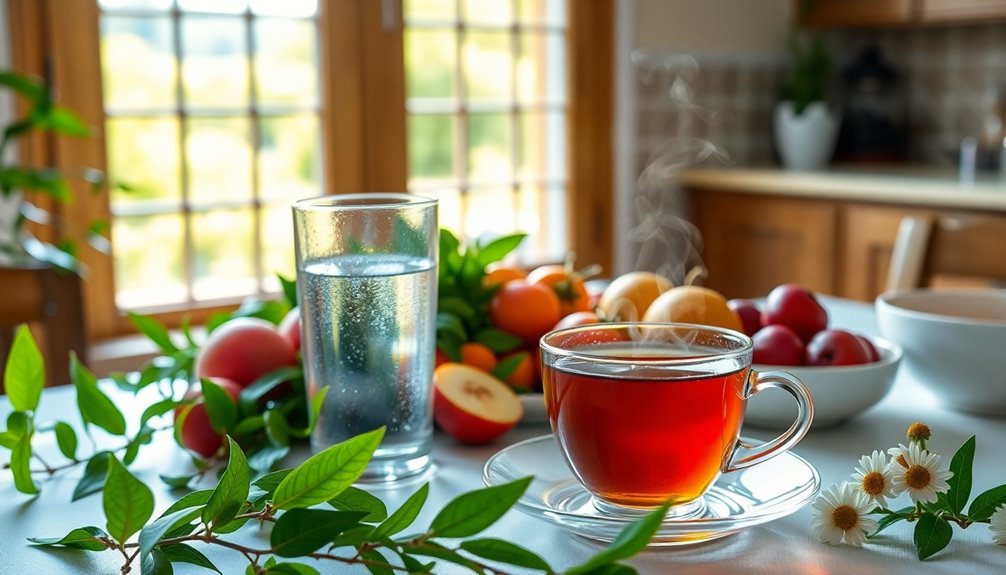
While incorporating probiotics can enhance your digestive health, avoiding carbonated drinks is another effective strategy to prevent bloating after meals. Carbonated drinks can introduce excess gas into your digestive system, leading to that uncomfortable feeling of fullness and swelling. To help you make informed dietary adjustments, consider these alternatives:
- Herbal Teas: Opt for soothing herbal teas like peppermint or ginger, which can aid digestion and reduce bloating.
- Infused Water: Try infusing your water with slices of lemon, cucumber, or berries for a invigorating, flavorful drink that won't cause gas.
- Sparkling Water: If you crave fizz, choose non-carbonated sparkling water. It provides the sensation without the added bubbles that lead to discomfort.
- Fresh Juices: Freshly squeezed vegetable or fruit juices can be a tasty and hydrating option without the carbonation.
Making these simple dietary adjustments can have a significant impact on your overall comfort after meals. By steering clear of carbonated beverages, you're taking a proactive step toward better digestion and well-being.
Chew Food Thoroughly
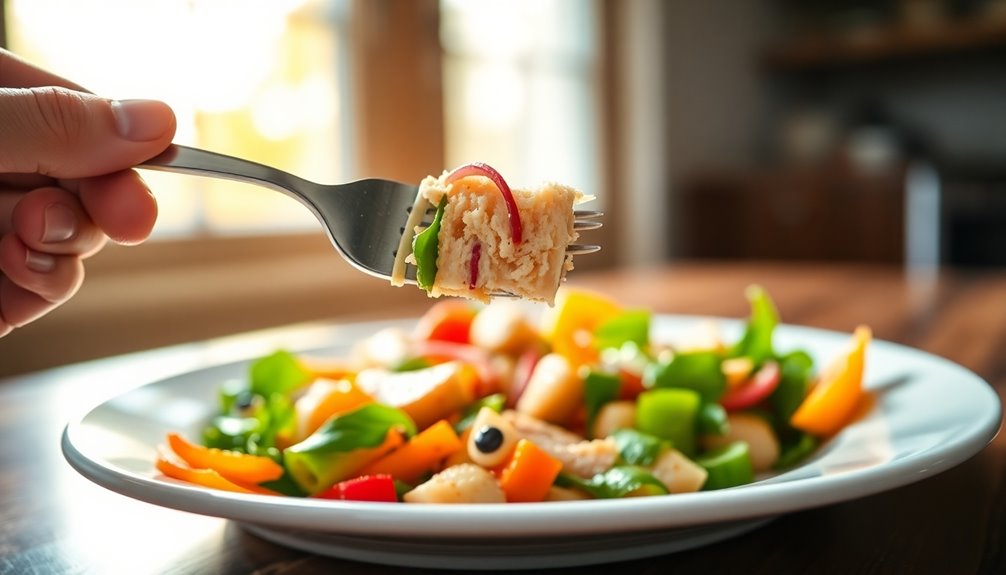
Chewing your food thoroughly is a simple yet essential way to enhance digestion and prevent bloating after meals. When you take the time to slow down and chew your food well, you're not just enjoying each bite; you're also allowing your body to break down the food more effectively. This process stimulates the release of digestive enzymes, which are vital for breaking down nutrients and improving absorption.
Many people rush through meals, often leading to inadequate chewing. This can result in larger food particles entering your digestive system, making it harder for enzymes to do their job. By practicing slow eating, you give your body the best chance to digest food properly, reducing the likelihood of gas and discomfort that often accompany bloating.
Incorporating mindful eating habits can be transformative. Start by setting aside distractions—put down your phone, turn off the TV, and focus on your meal.
Take smaller bites and chew each bite thoroughly before swallowing. Aim for at least 20-30 chews per mouthful. This not only helps with digestion but also allows you to savor the flavors and textures of your food, creating a more enjoyable eating experience.
Manage Stress Levels
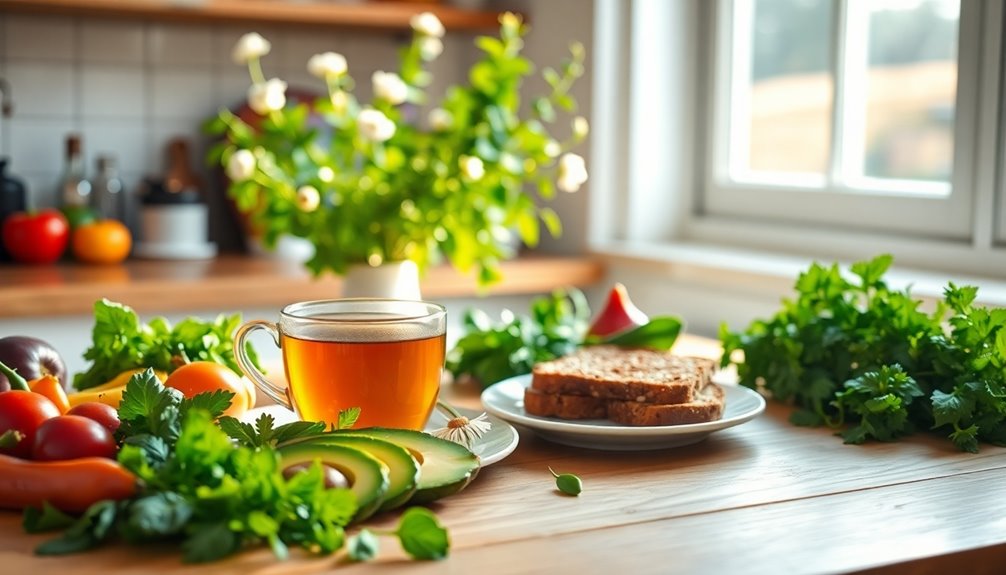
Stress can greatly affect your digestive health, and managing it effectively is essential for preventing bloating after meals. When you're stressed, your body releases hormones that can slow down digestion, leading to discomfort and bloating. By incorporating some stress management techniques into your daily routine, you can support your digestive system and feel better overall.
Here are four practical strategies to help you manage stress:
- Practice Meditation Techniques: Spend a few minutes each day focusing on your breath or using guided meditation apps. This can help clear your mind and reduce anxiety.
- Engage in Breathing Exercises: Deep breathing exercises can calm your nervous system. Try inhaling deeply through your nose for a count of four, holding for four, and exhaling through your mouth for a count of six.
- Establish a Relaxation Routine: Dedicate time each day for activities you enjoy, like reading or listening to music. This can create a sense of peace and balance.
- Connect with Others: Reach out to friends or family for support. Sharing your feelings can lighten your emotional load and strengthen your sense of belonging.
Implementing these strategies can make a noticeable difference in your stress levels and, consequently, your digestive health. Remember, it's not just about what you eat; your mental well-being is equally important in preventing bloating after meals.
Engage in Light Activity

Engaging in light activity after meals can greatly aid digestion and help prevent bloating. When you move your body gently, it stimulates your digestive system and allows food to pass through your intestines more efficiently. This doesn't mean you have to hit the gym; instead, think about incorporating activities like walking, gentle yoga, or even a bit of dancing into your post-meal routine.
Walking is one of the simplest and most effective ways to engage in light activity. A short stroll around your home or neighborhood can help your body process food and reduce feelings of fullness. Aim for at least 10-15 minutes, and you'll likely notice a difference in how you feel.
Gentle yoga is another fantastic choice. Poses like Cat-Cow or Child's Pose can promote relaxation and facilitate digestion. Plus, the focus on breathing can enhance your overall sense of well-being.
If you're feeling a bit more energetic, why not put on your favorite music and dance? It's a fun way to get your body moving and can elevate your mood, making you feel more connected to those around you.
Don't forget post-meal stretching, either! Simple stretches can relieve tension and promote blood flow, further aiding digestion. By adding these light activities to your routine, you'll not only help prevent bloating, but you'll also create a healthy habit that fosters a sense of community with those who share similar wellness goals.
Frequently Asked Questions
Can Certain Food Combinations Worsen Bloating Effects?
Certain food combinations can indeed worsen bloating effects. When you mix proteins and carbohydrates, for instance, your digestion might struggle, leading to discomfort.
Practicing food combining can help your digestive system work more efficiently. By pairing foods wisely, you might find effective bloating remedies that suit your body's needs.
Experiment with different combinations, and pay attention to how your body reacts to find what works best for you and helps you feel comfortable.
Is Bloating After Meals a Sign of a Food Intolerance?
Bloating after meals can indeed signal a food intolerance. When your body struggles to digest certain foods, it may indicate insufficient digestive enzymes or an imbalance in gut bacteria.
Probiotic supplements can help restore this balance, improving digestion and reducing bloating. If you notice consistent discomfort, consider tracking your food intake and discussing it with a healthcare professional.
You're not alone in this—many others experience similar issues and find relief through simple adjustments.
How Long Should I Wait to Lie Down After Eating?
You wouldn't hop on a spaceship right after a meal, right? Similarly, it's best to wait about 2-3 hours before lying down. This waiting time helps ensure ideal digestion, allowing your body to process food effectively.
Instead, consider engaging in light post meal activities, like a gentle walk or sitting upright, which encourages better digestion and reduces discomfort. So, keep your sitting position in mind for a smoother experience after eating!
Are There Specific Herbs That Can Help Reduce Bloating?
Yes, there are specific herbs that can help reduce bloating. Herbal remedies like peppermint, ginger, and fennel are known for their digestive benefits. Peppermint relaxes the digestive tract, while ginger helps ease nausea and promotes digestion. Fennel can reduce gas and bloating.
Incorporating these herbs into your meals or consuming them as teas may support bloating prevention. You might find these natural options to be a comforting addition to your wellness routine.
Can Bloating Be Triggered by Eating Too Quickly?
Yes, bloating can definitely be triggered by eating too quickly. When you rush through meals, you swallow air along with your food, which can lead to discomfort. Improving your eating habits—like taking smaller bites and chewing thoroughly—can enhance your digestive health.
Conclusion
By embracing these natural strategies, you can keep bloating at bay and enjoy your meals with ease. Think of your digestive system as a garden; with the right care—mindful eating, hydration, and stress management—you'll cultivate a thriving environment. Remember, small changes can lead to big improvements in how you feel after eating. So, take charge of your gut health, and savor every bite without the discomfort of bloating weighing you down.

